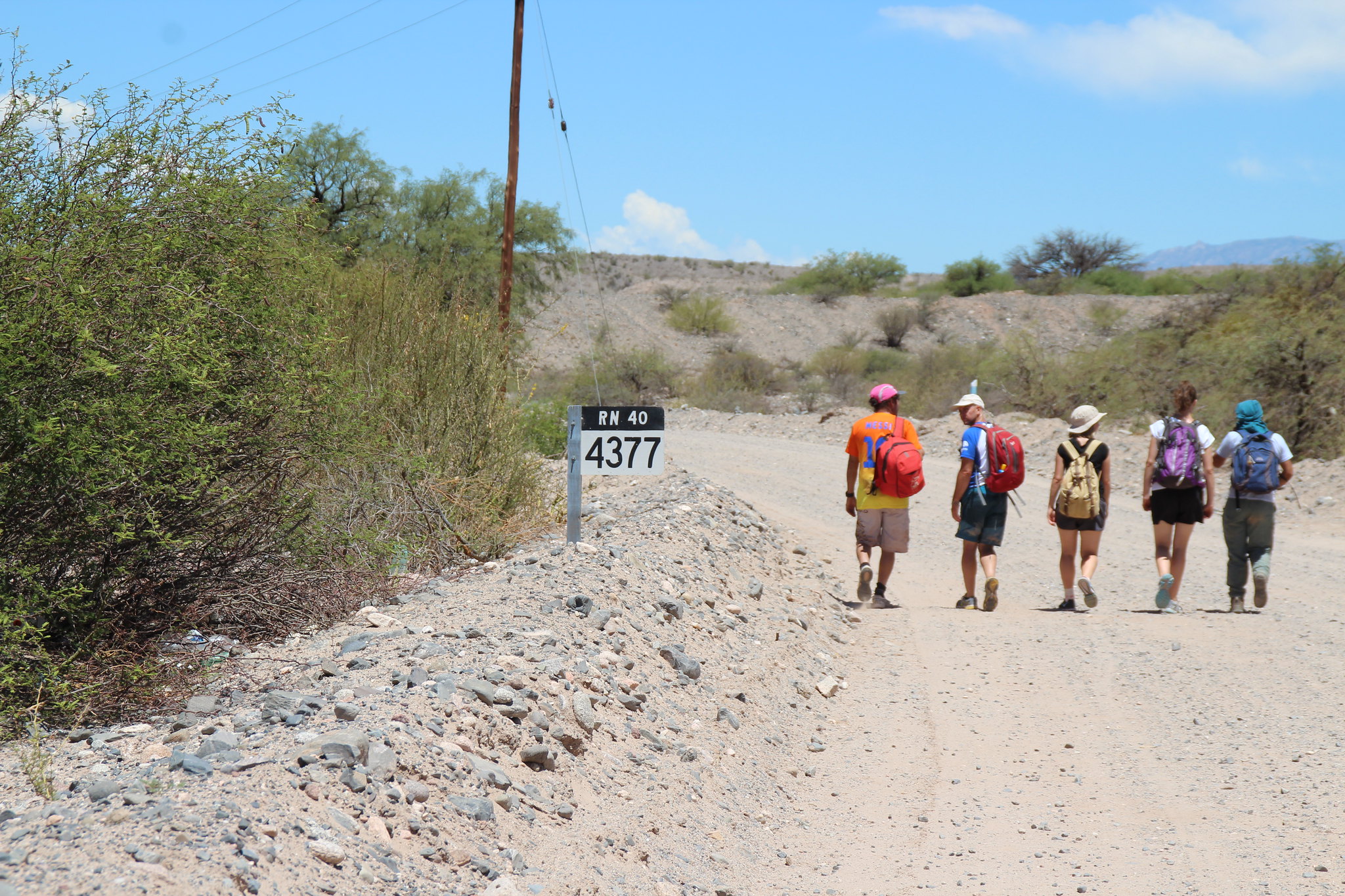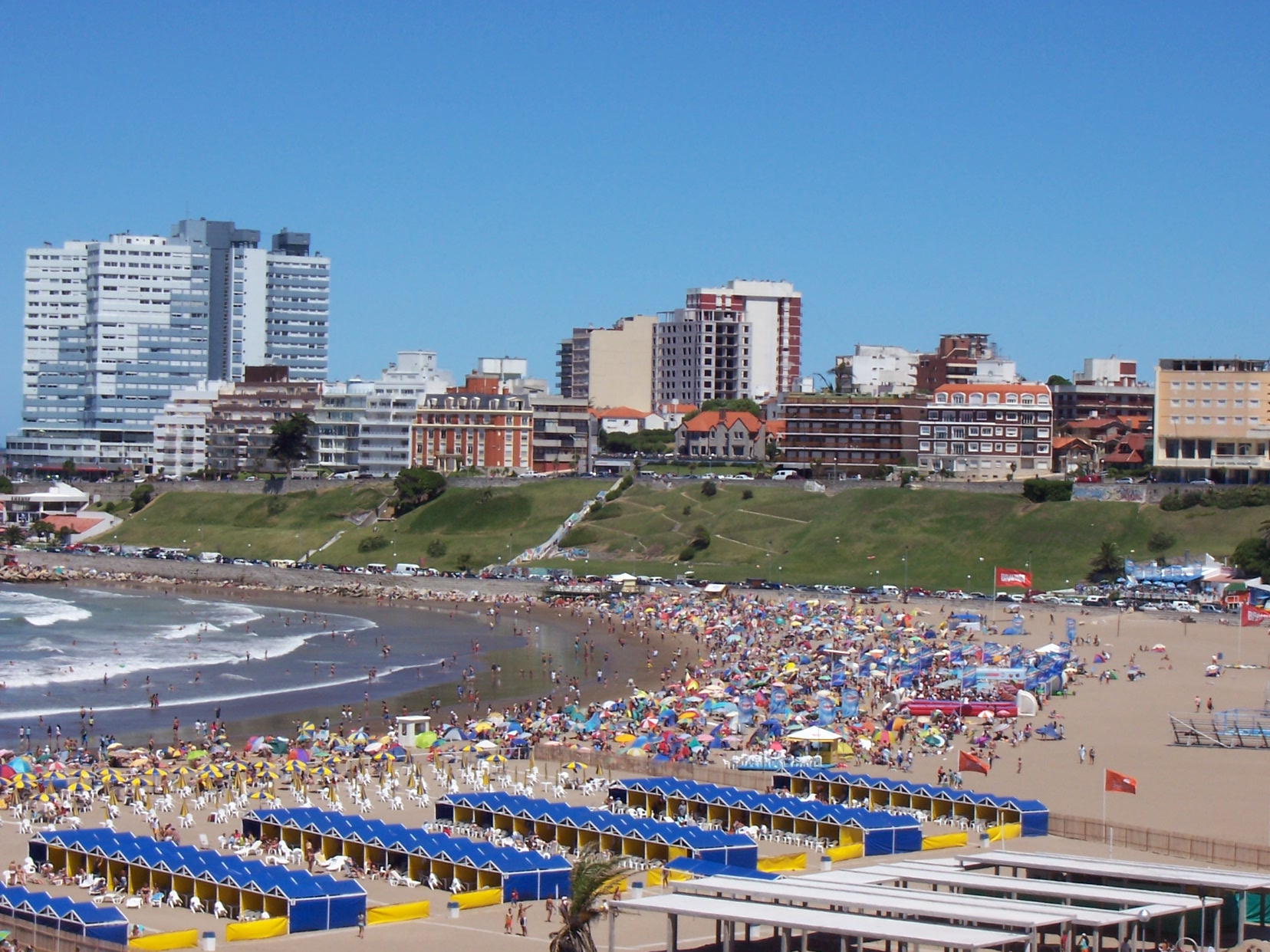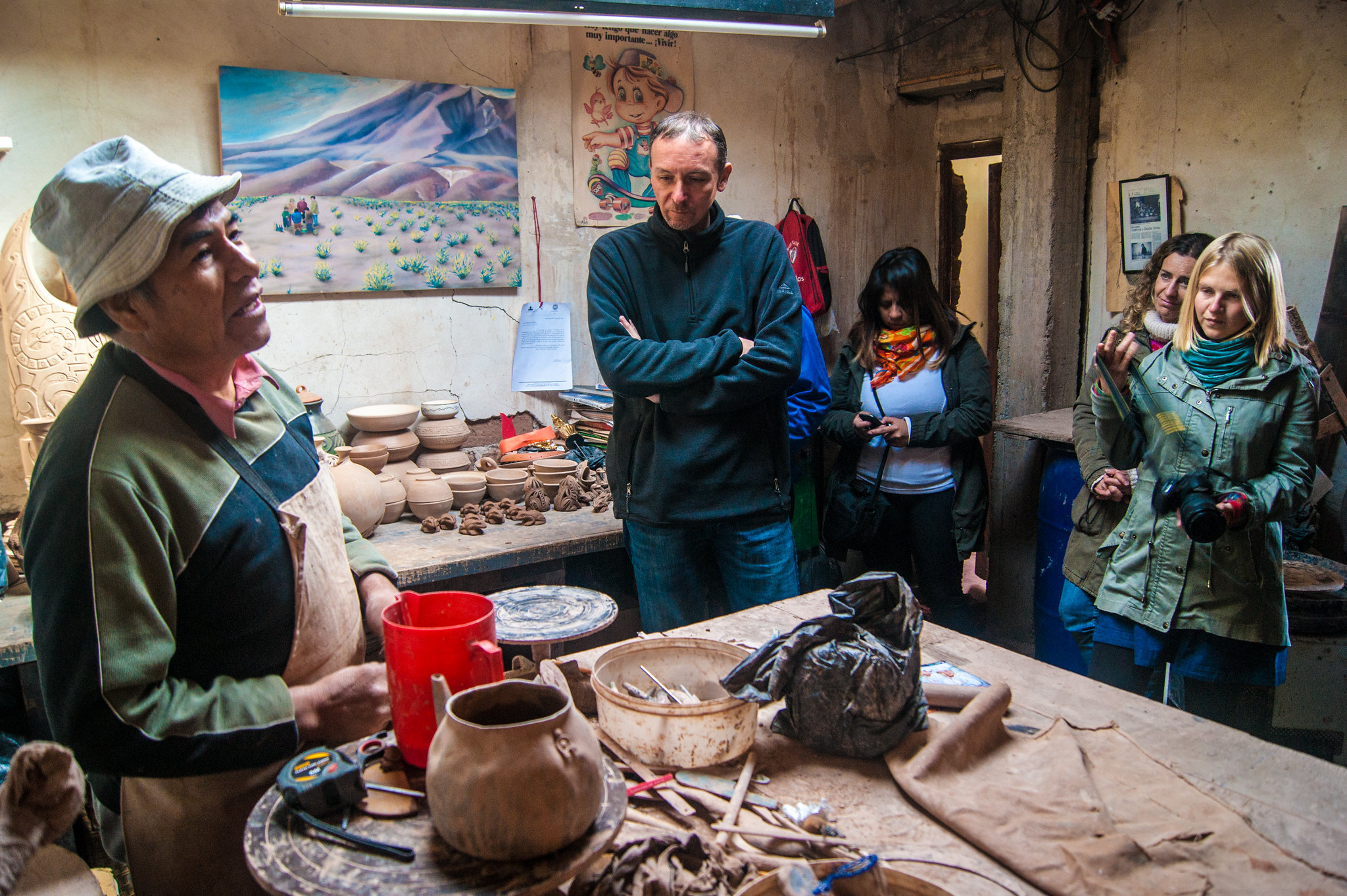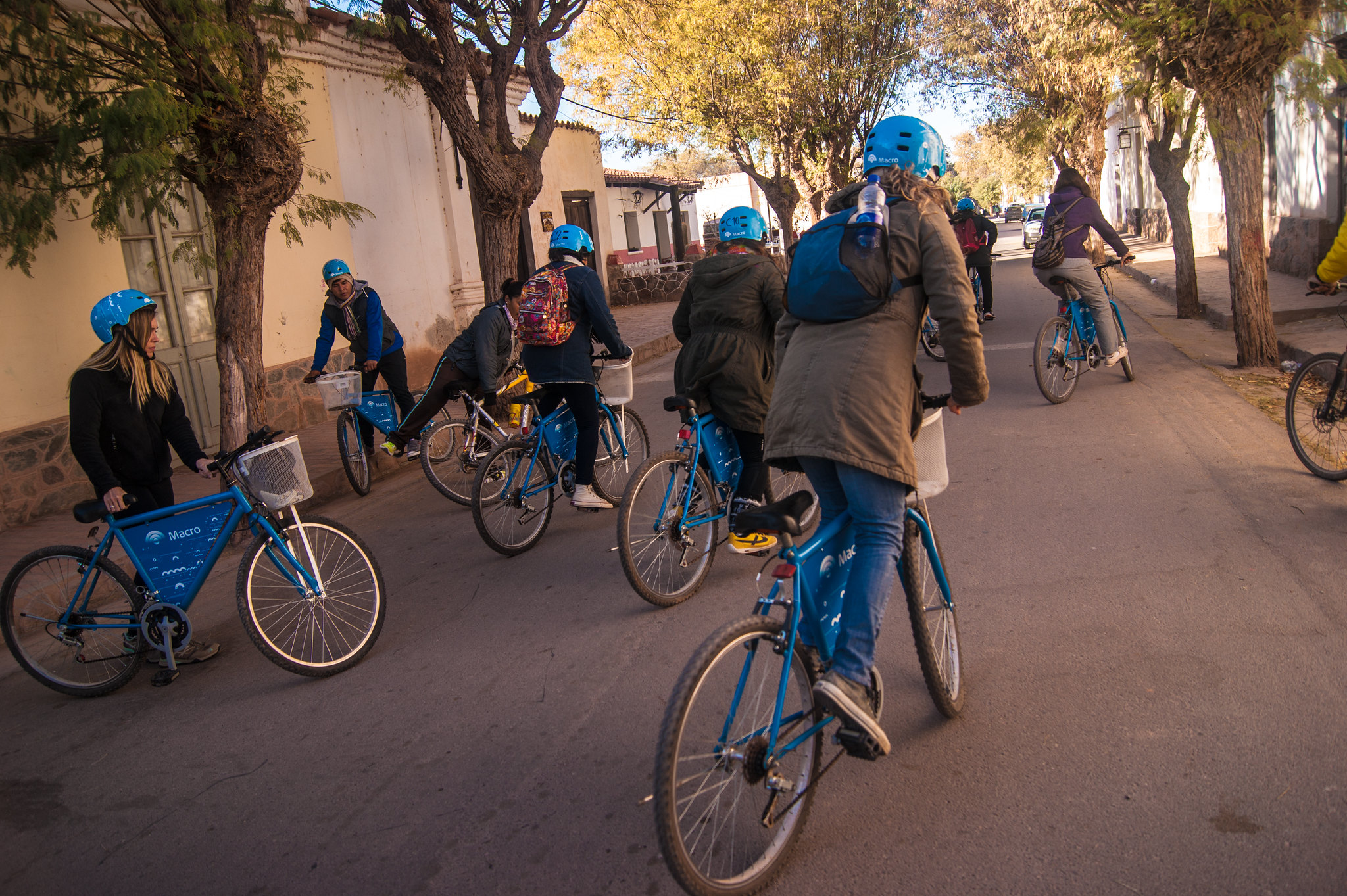27-05-2020
Pandemic: opportunities and disputes in the next tourism in Argentina
Rodrigo Fernández Miranda & Verónica Dziencielsky | Alba SudThe future of Argentina’s tourism is open. There are options for its transformation into a more equitable sense, open to the needs of large majorities. But continuity can also predominate. What actors and spaces in dispute configure the playing field?

Photography by: Salta. Llorenç Planagumà | Alba Sud.
The global crisis generated by the Covid-19 pandemic opens up new lines for reflection on society and the economy in general, and on tourism activity in particular. This situation has no precedent from which to grasp to assess the way in which the eventual exit will take its course. It is a total social fact that shakes social actors, substantially modifies their relationships and their ways of life, and has repercussions on all local, national and global institutions.
For the first time in history, the globalized economic system, as well as the movement of goods and people, was practically forced to stop. Along these lines, the World Tourism Organization (UNWTO) states that all of the two hundred and seventeen tourist destinations on the planet have introduced restrictions on international travel, which are the most rigorous in history.
An absolute centrality is also observed in communication and the construction of meanings. The production of news and the dissemination of speeches revolves around the virus with the analysis and recommendations of experts, the constant updating of the figures of infections and deaths, and the consequences on societies. There has also been a non-minor display of misinformation and fake news.
In Argentina, with its deep historical structures of inequality, this irruption adds to a period of social and economic crisis generated by a new cycle of neoliberal policies since 2016. It is expected that the peak of infections in the country will arrive weeks after the production of this text due to the preventive and compulsory lockdown dictated early by the National Government. So far, the numbers of those affected are significantly lower than in other countries in the region and the world. However, the virus began to circulate strongly in the popular neighborhoods of the Metropolitan Area of Buenos Aires in May. There, living conditions are marked by overcrowding, precariousness and lack of access to essential services.
Assuming the complexity that this implies, the aim of this article is to decipher some keys that allow an approximation to the possibilities of transformation of tourism in the near future, once the situation of health emergency ends. Some triggering questions for analysis are: What impacts could this crisis have on tourism? What perspectives do central actors foresee? Will there be changes in tourism consumption practices? And, finally, what contributions and opportunities for tourism can be promoted from the Social and Solidarity Economy (SSE)?
Tourism and pandemics
The economic consequences of the pandemic are still of unknown dimensions, although there are some certainties.First, different international organizations forecast the most serious and deepest crisis since the Great Depression.Second, in the same vein as the health crisis, the economic crisis will have a greater impact on the most vulnerable social sectors.
In the case of tourism, there will be companies, workers, destinations and consumers that will be much more impacted than others. Some companies will stop winning and others will lose or disappear. Certain destinations will be deeply affected by the lack of demand, with their communities suffering an increase in unemployment, migration, inequality or social exclusion, and having to reconvert their productive matrix. Some of the workers in the sector will lose their jobs and the middle and popular sectors will have less capacity for tourism consumption.

Barrancas. Source: Llorenç Planagumà | Alba Sud.
However, beyond the expected particular impacts, the central question is to inquire about the consequences that the pandemic may have on the tourism model. In this regard, it is interesting to evaluate what possibilities for real change exist in the dominant modes of tourism production and commercialization and in the relationships and power correlations between the actors involved. Although with nuances, the exit offers the following dilemma: a return to the previous normality or a paradigm shift. It is precisely in this second option where possibilities get opened for the Social and Solidarity Economy.
Tourism, before
As in many other countries, tourism in Argentina was radically swept away by the outbreak of Covid-19. Tourism did not decrease, but stopped at practically zero. Going back a bit, to illustrate the previous starting point, a brief characterization of tourism in the country is proposed.
From a brief historical perspective, we can highlight how the first tourist centers in the country were founded at the end of the 19th century. Though, it was not until the first Peronist government (1946 - 1952) that the so-called democratization of tourism occurred thanks to the expansion of rights, such as paid vacations and the improvement in the living conditions of the working sectors. Since then the activity has been growing and expanding, gaining prominence on the economic, social and cultural levels.
Currently, the country receives more than 7 million international visitors a year with a significant increase in recent years as a consequence, among other factors, of the devaluation of the national currency. Some 50% of Argentines (21 million) practices tourism, whereas only 10% travels abroad (AET, 2015).
According to the Association of Tourism Hotels (AHT), the sector represents the fourth item in the inflow of foreign currency. In 2018, the total turnover was more than 55 billion dollars, which represents 10.3% of GDP: the weight of tourism on the Gross Domestic Product is four times greater than that of software, clothing and textiles. Tourism is also the main activity in terms of job creation: the sector as a whole generates approximately one million formal jobs.And the number of informal employment is uncertain.
In the last decades, there has been a constant growth of travel, infrastructure and tourism beds that has been massifying and hyperturistifying the country’s destinations. This process has not been innocuous in any case, but has generated various impacts; for example, on workers’ quality of life (Mazzini, 2009) as well as residents’ quality of life (Benseny, 2006), environmental deterioration (Dadón, 2002) or the destruction of resources (Fernández Miranda, 2015).
Pandemics, actors and discourses
As a first look at the future scenario, the discourses of the public and business sectors are summarized below. This can help us to approach to dominant actors’ formulations.
Public actors. The Ministry of Tourism and Sports of the Nation highlights that the tourism sector is the most affected by the pandemic and estimates that some 200 thousand jobs could be lost. In this regard, it is proposed to implement a plan "that allows the private sector to remain standing" once the health crisis is finished. This would be accompanied by the articulation of dialogue tables with business chambers and unions.
Aid plans are planned for entrepreneurs through the Emergency Assistance Program for Work and Production and specific measures for the sector, such as financing through the Plan 50 Destinations. Part of public aid to "guarantee the payment of private sector salaries" during the crisis. Through the Tourism Fund, half a million dollars will be allocated "to support tourism entrepreneurs who develop sustainable projects that promote employment, roots and human development in the territory."
Public sector’s discourse points out the role of tourism as a generator of work and highlights positive expectations about its recovery, "it will be one of the industries that will reactivate faster when this situation ends.” As a priority, the actions of the State aim to "save" the sector, achieving a "reactivation" as quickly as possible. As an ideal short and medium term horizon, it is proposed to return to the tourism situation prior to the pandemic.

Mar del Plata. Source: Leandro Kibisz,creative commons license.
Business actors. First, companies and tourism lobbies statements highlight all damages caused by the pandemic and the quarantine. Two ideas embedded in these narratives are the closure of SMEs and travel agencies, as well as job losses. Unlike other sectors, there is no pressure to make quarantine more flexible in the statements of private tourism actors. They assume that there would still be suspicion from consumers about practicing tourism.Psychosociocultural consequences are also expected that will affect tourism practices beyond lockdowns, such as "dread", "prejudice" or the difficulty in "eradicating fear" to the virus.
These speeches do not coincide with the optimism of the State about the times of “recovery” of the sector: “The most optimistic predictions indicate that all of 2020 is completely lost. The few say that tourism could only return to normal within two years.” Regarding the proposals, private actors request a transfer of public resources to mitigate the impacts and be able to return to a situation similar to the previous moment. Meanwhile, the giants of online agencies took action with the suspension of employees and the reduction of salaries until the end of September "to guarantee the sustainable development of the company in the long term," based on an agreement with the Commerce Union trade.
There is harmony, similarities and complementarities between the discourses of public sector and private tourism actors. The State offers what private agents request, both raise the need to return to the situation just before the outbreak of the pandemic as quickly as possible. The main difference rests upon the optimistic or pessimistic emphasis of their prospects. These discourses share, in addition to a marked economic orientation, significant silences regarding social and environmental issues. It is key to contemplate these invisible dimensions in this rhetoric in order to complete the illustration about the consequences of the pandemic on tourism activity.
The first shocking images from the lockdown were about wild animals in cities, clean waters when those some weeks ago were turbid, or data registering the reduction of pollution. Regarding social aspects, issues such as informal and precarious employment in tourism are omitted (Mazzini, 2009; Tottino & Catalano, 2015) where workers do not have essential social benefits. These facts also help to describe the normality to which it is intended to return. The speeches of the central actors focus on the reactivation and return to the previous stage, with omissions and without problematizing that previous stage. Statements converge on a lack of critical perspective and a lack of proposals to review and modify some practices. The tourism model is out of the agendas and discourses of the main players. Beyond these narratives, it is necessary to make visible emerging approaches that offer a broader and more complex view, such as the solidarity agents who propose “other tourisms”.
Thinking scenarios and opportunities from the foreseeable
Conundrums about the tourism model of production, marketing and consumption accumulate. Despite the uncertainty generated by the speed with which changes are taking place, it is necessary to think about the future of tourism and contribute to construct it in a different manner. By indicating some expected consequences of the coronavirus on tourism in Argentina, the possibilities of action in this scenario will be analyzed. This will allow us an approach to the context and the conditions in which all the actors will have to move.
Forced degrowth and self-management
Theorists of degrowth have always emphasized that degrowth processes would be either an agreed and planned decision by the majorities or a chaotic imposition due to changing natural conditions. Degrowth is forecast to be the greatest certainty that the tourism sector will have in the short and medium term. Several factors influence its sharp contraction: impoverishment of a significant part of Argentinian households and its consequent restriction of expenses, low receptivity of foreign tourists, or fear of resorting to crowded spaces.
In line with the drop in tourism, a strong impact is expected on small and medium-sized hotels, transport, gastronomy and tourism agencies. This, added to an inevitable “domino effect”, would undoubtedly imply a change in the tourism supply composition. This means in any case thousands of new unemployed. The expected closure of companies could give rise to two types of scenarios: the first, with a more concentrated supply and sustained by the same type of demand; the second, the organization of employee actors for the adoption of self-managed models that maintain their sources of work.

San Carlos. Source: Javier Tejera | Alba Sud.
In this second case, the recovery of companies by their workers and the creation of worker cooperatives that provide tourism services emerges as an opportunity. This type of processes, which implies that workers take charge of the means of production and self-manage the company, could occur mainly in activities that demand a lot of labor, such as hotels or gastronomy. In the country there is a history of the recovery of companies in general, hotels, such as Pipinas, Bauen, Pismanta or Quijote, and restaurants, such as Alé Alé, Los chanchitos, La Casona or Lalo.
Workers’ recovery of companies from bankruptcy or closure and the consequent constitution of cooperatives could be a central strategy, not only to minimize damage, but also for a more equitable composition of the sector. This could only happen if this alternative is conceived as a viable option that is driven by the actors involved, is supported by a broad social base and accompanied by other agents of the social and solidarity sector; and that, instead of being repressed, it is legitimized by the State.
Social distancing and sustainability
It is expected that social fear to the pandemic will continue after the period of mandatory lockdown. Planning a trip to a distant environment or getting on a plane, train or bus will last some time: it is unlikely that tourism practices will return to their previous state in the short term. Government warns that tourism with social distancing should be promoted; accordingly, the Argentina’s Chamber of Tourism assumes the need to "avoid large concentrations of tourists."
On the side of large companies such as airlines or hotel chains, health measures and protocols concepualized as a Covid-free certification. The Ministry also proposes a program of "Post-Covid19 good practices" and stands out to be working on protocols "so that the return of the activity is safe." The goal is to generate guarantees so that citizens can confidently restart their tourism practice as soon as possible. There are already framed ideas such as taking the temperature of air passengers or the possibility of placing acrylic dividers in the seats of the planes.
Social distancing would give space, at least for a time, to the visibility of narratives and the permeability of practices on sustainable tourism. The individual fear of contagion can promote reactionary feelings, discriminatory and individualizing practices too. But it can also give rise to an "embodied consciousness" about the interdependence between people and ecosystems that encourages other ways of traveling, knowing and resting. Social distancing antagonizes mass influx and the large-scale model, and can lead to the push for slower tourism practices. It can open up a possibility for sustainability.
Short distances and the proximity option
Another change that is expected in the post-pandemic scenario is that tourism will be carried out over short distancesduring 2020 and possibly part of 2021. The actors assume this: Government promotes "closeness" and encourages travel within the national territory, and the Argentina’s Chamber of Tourism affirms that proximity will be "the axis of the recovery of the activity." Proximity affects the logic of the cult of speed and hits the waterline of globalized tourism.Thus, it generates opportunities for other actors who propose the claim of stillness, or proximity tourism practices and the revaluation of local environments and cultures, such as rural, peasant or community-based tourism. The proximity is also a possibility for a more sustainable tourism.

San Carlos. Source: Javier Tejera | Alba Sud.
Proximity affects the logic of the cult of velocity and hits the plimsoll line of globalized tourism. Thus, it generates opportunities for other actors who claim slowness, or proximity tourism practices and the revaluation of local environments and cultures, such as rural, peasant or community-based tourism. The proximity is also a possibility for a more sustainable tourism. These changes can also be linked to pre-Covid consumer trends. A study carried out by booking.com last October analyzed tourism trends. According to its results, around 50% of Argentines were interested in reducing the environmental impact generated by excess tourism. And, in that regard, they would be willing to modify the destinations or means of transport used in order to avoid overcrowding and help the preservation of the environment. This study not only demonstrates the possibility of exploring this type of practices but also that its appropriation will be a space of dispute. As the tourist cake is reduced, proximity will be a strategy adopted by actors of diverse origins. Big capitals that until now had no interest in local tourism will begin to fight for this modality.
Time, fragility of changes and disputes to come
In all cases, it is important to take into account the temporal dimension of the aforementioned changes. Three central issues will happen and will enable tourism activity again: at the country level, the Government will withdraw the restrictions, at the global level the WHO will give the go-ahead to travel, and the fear of contagion will diminish. Changes will be temporary, and the foreseeable course of events is that, according to the will and interests of the central actors, a progressive return to a similar model to the preceding one. This will presumably happen unless the most affected sectors (workers, small companies, solidarity or community organizations) organize and articulate to generate alternatives and influence decision-making spaces that can modify this course.
A political and meaning dispute will probably take place during this period. Discourses and proposals, in many cases antagonistic, will contrast. There will be a struggle to establish a dominant view on which model of tourism development is the most convenient for the common good. It is in this temporary space where SSE workers, actors and related sectors together will be able to maximize their efforts to disseminate their arguments and make visible their proposals and experiences that allow the practice of a more supportive, equitable and sustainable tourism.Although assuming the unequal correlation of forces and limited time, this is precisely the main window of opportunity.
Setting next tourism
To lay the reflection, critical factors are raised for the configuration of the next tourism in Argentina.
The role of the State. What will be the orientation of public policies in general and tourism in particular and the correlation of forces in the decisions of the State. So far there is no intention to change the paradigm of tourism or the orientation of policies towards solidarity experiences. On the contrary, everything points to a transfer of resources that guarantees a return as quickly as possible to the previous stage.
The role of citizenship. What impact the pandemic will have on the representations and major practices around tourism. Changes in consumer behavior are expected to occur, although its orientation and duration are difficult to establish. There may be checks and balances in the tension between the fear of traveling and the vindication of freedom through tourism consumption. From fear can also arise an unlearning, an awareness about the damages and risks of the model, and a questioning of that idea of freedom, which would allow greater visibility of associative and transformative tourism experiences.
Capabilities of social actors. What capability will the actors from the social, popular and solidarity fields have for the articulation, inter-cooperation and construction of synergies in relation to tourism. The stable organization will be able to allow a greater coupling between responsible demand and solidarity supply. As in other crises, the newly unemployed and informal workers can be the new victims, or become strategic actors that strengthen cooperation ties for the construction of another tourism model.
Community organization. Another factor links to the possibility that members of the populations in the destinations can work together to, through different forms of organizational structure, carry out or support tourism projects that respond to the interest of the community. This implies a strength in the organization of the communities and a level of social participation that enables the planning and management of community-based tourism in the territories.
Ultimately, the configuration of the next map of Argentina’s tourism will be determined by who are the actors that drive and lead the transformations or, on the contrary, the continuities of the activity. The possibility of paving a way out where the general interest prevails must arise from the will, consensus and the consolidation of cooperative relations between the State, solidarity organizations and organized communities. In this scenario, social actors can spur on the vast accumulated experience in the country.
The next tourism is still a story to write; and a fragment of its narrative will depend on the capacity for adaptation, innovation and articulation between the actors who, from different parts of the geography, propose and put into practice tourism alternatives crossed by other rationalities, values and ideas. However, it is important to avoid a naive look. The correlation of forces, the ability to influence the State and the collective imagination shown by the lobbies of the sector reveals a latent risk: that the post-Covid-19 scenario could bring a more concentrated, exclusive and unsustainable tourism model. This would not be a dystopia, but a certain possibility.
